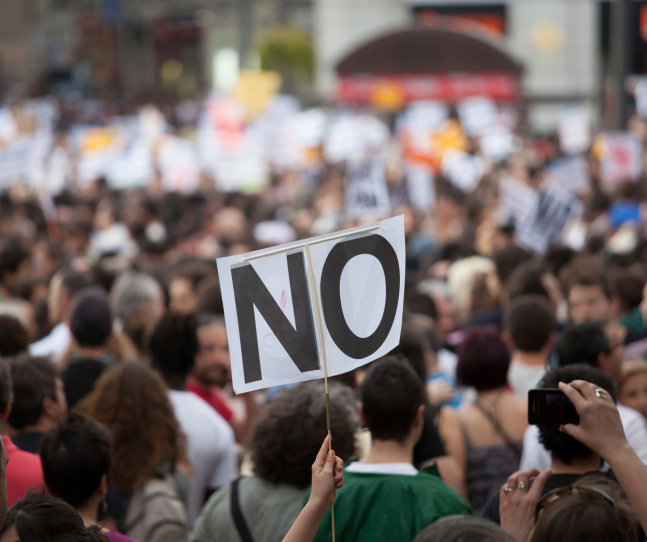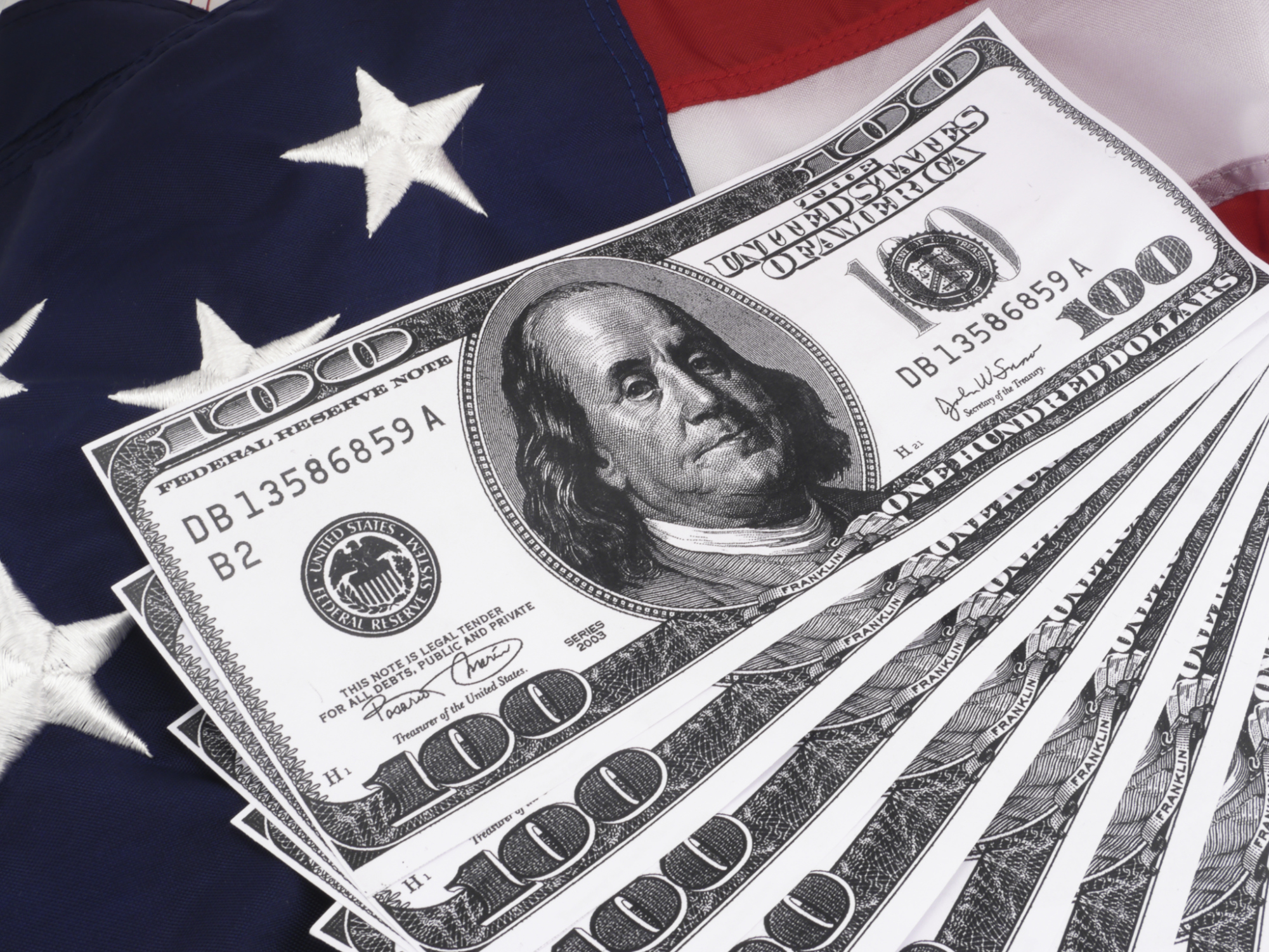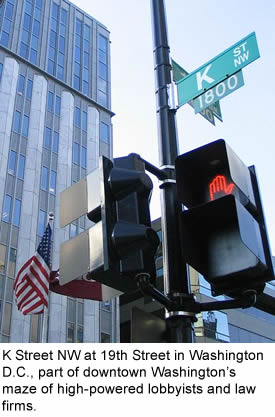Learn
Special Interest Groups

Political pressure does not go away after the election. Political parties and politicians relentlessly feel the heat from special interest groups. Special interest groups are organizations or industries that pressure elected officials to vote in favor of their particular issues or interests. Interest groups are different from political parties in that they do not try to nominate candidates to office. Instead they use information and the power of popular support as well as campaign contributions in an attempt to exert influence.
Types of Special Interest Groups
There are thousands of interest groups of all shapes and sizes with various structures, causes, and power. Most groups fit into the following categories:
Labor Interest and Professional Interest Groups organize to protect workers or specific professional groups. Examples: American Medical Association, AFL-CIO, NEA
Public-Interest Groups work for the best interest of the general public on issues such as education, human rights, consumer rights, and the environment. Examples: Greenpeace, the Humane Society
Business Interest Groups represent business, corporation, and trade interests. They are the most common type of interest group and are considered the most powerful in government. Example: U.S. Chamber of Commerce, oil industry, and tobacco industry
Cause Groups have a non-economic focus and represent a segment of society with a non-economic focus on a particular cause. They may include a wide range of issues like religion, veterans, disabilities or they may include single-issue causes like drunk driving or autism. Examples: The Christian Coalition of America and MADD
Special Interest Group Functions

Interest groups are sometimes called pressure groups because they attempt to influence public policy by persuading politicians to vote in a way that maximizes their interests.
Endorsing candidates
Lobbying politicians
Educating the public
Utilizing the legal system
Read "Interest Group". As you read the article, complete section I of 8.02 Special Interest Groups. Be sure to save your work to use later in the lesson!
Power in Numbers
Interest groups persuade politicians with their ability to sway public opinion about a candidate through endorsement, or public declaration of support for a particular candidate. Interest groups are not solely political, but they do become involved in politics by providing elected officials and their staffs with information that is favorable to their point of view. The people hired by interest groups to provide information and apply pressure to elected officials in order to gain their support are called lobbyists. These lobbyists have substantial influence and power over Washington politicians. In recent years, new laws have been passed in an attempt to limit activities of the lobbyists and strengthen ethics rules for legislators.
Read the article Moyers on America: The Land of Lobby to learn more about lobbying.
Education is Power

Not only do hired lobbyists personally contact politicians to sway their vote, but they also organize large numbers of voters to hold public rallies or demonstrations to express their opinions and apply public pressure on the politicians. Furthermore, letter writing campaigns are often organized to not only pressure the elected officials, but also to help educate the public on the issues. These efforts, organized by lobbyists at the local level to generate public support and influence lawmakers, are known as grass roots campaigns.
Litigation, or the process of bringing a lawsuit to enforce a particular right, is another action utilized by special interest groups to influence public policy.
Money is Power

One of the most substantial ways special interests groups influence politicians is money. Lobbyists cannot legally offer money to elected officials in exchange for their votes. However, in the past, lobbyists have been known to offer gifts like trips or dinners to politicians. These practices have recently been limited at the federal level by ethics rules.
Though lobbyists cannot offer money to elected officials, the interest group executives who hire them often make campaign contributions. These contributions can be extremely valuable considering the cost of elections in America has risen dramatically in recent years.
Watch What's behind the rising costs of presidential campaigns? (6:07) to learn more about the rising costs of campaigning in America.
Funding for Campaigns
The cost of financing a campaign can create a huge obstacle for candidates seeking public office. So, where do potential candidates get money to fund their campaigns?
Candidates fund campaigns via money from four sources:
Individual donations may be contributed by Americans to campaigns.
Political parties have committees that distribute money directly to campaigns. Donations by political parties are limited by law.
Public funding has been available for presidential candidates since 1976. The public financing system allows each candidate to accept government funds in exchange for a pledge not to exceed a specific spending limit. Many candidates have opted out of public funding because they can easily raise more money from private sources.
PACs collect individual contributions to distribute to candidates or political parties. Donations to PACs are limited to $5,000 per year.
Federal Election Commission
Since the 1970s, federal election laws have been aimed at curtailing the potential control special interest groups, corporations, unions, and wealthy Americans may gain through campaign contributions. In 1971, the Federal Election Campaign Act (FECA) was passed in an attempt to level the playing field for candidates. The law dictates how candidates for federal office may raise funds, as well as from whom and in what amounts. Candidates must establish a political committee and register with the Federal Election Committee in order to report funds.
The Federal Election Commission (FEC), created to administer and enforce the FECA, does not actually conduct elections, but rather it has the responsibility of regulating campaign finance.
Explore FEC to learn more about how much and to whom contributions are made.
Political Action Committees
Since FECA was passed to limit donations, wealthy donors and powerful interest groups have found other avenues to contribute money in order to influence elected officials. For example, Political Action Committees, or PACs have been created by special interest groups to avoid limits placed on campaign contributions by the federal election laws. PACs basically raise and contribute money to political parties and candidates for the interest groups.
Political Action Committees have had a substantial impact on elections in American. A person who wants to contribute to a campaign may write a check to a PAC specifically for campaign donations and the PAC will then contribute money to individual campaigns. For example, if someone supports stricter environmental regulations, they may contribute to the PAC that supports Greenpeace and it will make contributions directly to individual candidates. In short, larger donations from a PAC can be more influential on a candidate than smaller donations by individuals, giving interest groups represented by the PACs greater power in politics.
527 Groups
A recent development in funneling money for elections is the tax-exempt organizations called 527 groups, which are named after the U.S. tax code section that exempts certain groups from paying taxes. These groups are organized primarily for the purpose of influencing the selection, nomination, election, or appointment of an individual to a federal, state, or local public office. 527 political organizations, such as MoveOn and Swiftboat Veterans for Truth, are not regulated by the Federal Election Commission or by a state elections commission. Furthermore, they are not subject to the same contribution limits as PACs.
Campaign Finance Reform

Critics of PACs and 527s believe our current system gives wealthy donors and powerful interest groups too much influence over public policy. One of the most recent attempts at reforming the problems with campaign finance occurred in 2002 when Congress passed the Bipartisan Campaign Reform Act, also known as BCRA or McCain-Feingold Act. It dealt mainly with two aspects of campaign ads, limiting issue ads by interest groups and banning soft money for advertising.
Court Cases
On the other hand, campaign finance laws restricting contributions have been challenged in court by supporters of special interests who see campaign giving as a constitutionally protected right to free speech. Court decisions have created changes in the rules regarding campaign finance over the years.

For example, in 1976, the Supreme Court decision in Buckley v. Valeo struck down several provisions of the FECA Amendments of 1974, while upholding the ACT's disclosure provisions. The Court struck down limits on expenditures by candidates and independent groups or individuals based on First Amendment rights. The Court upheld limits on contributions to candidates, mandatory disclosure, and voluntary government funding of campaigns.
The FEC's interpretation and enforcement of cases like Buckley v. Valeo determines the overall impact of the case and others like it.
Court Cases Continued
Each of the court cases below had an impact on campaign finance rules. Examine each case closely.
As you examine the cases, complete section II of 8.02 Campaign Financing. You will submit it later in the lesson.